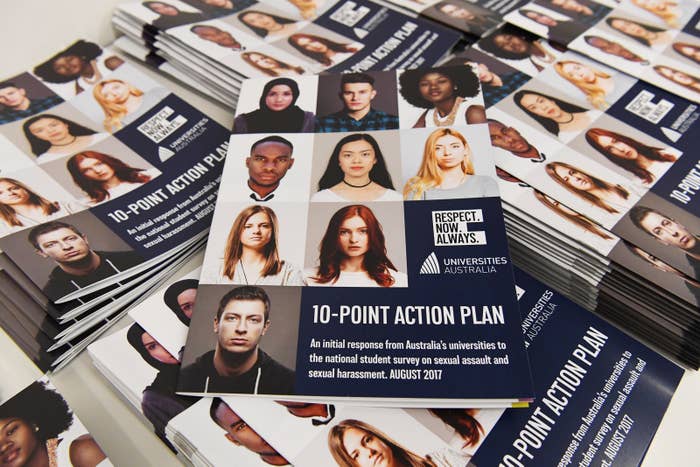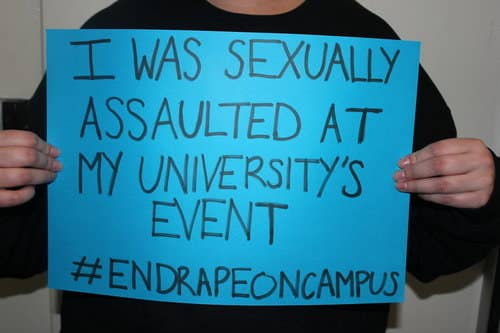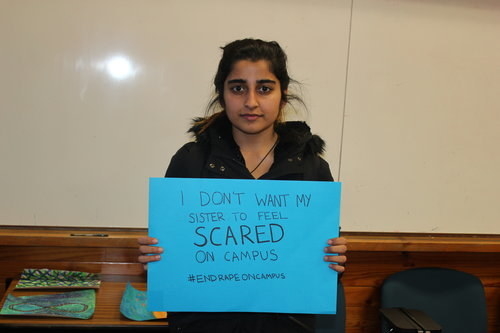
Numerous students reported harrowing experiences of sexist hazing; being secretly filmed in bathrooms; and being assaulted and raped amid the alcohol-fuelled culture of university colleges and residences, for a new report into campus sexual assault in Australia.
The landmark Human Rights Commission report, released Tuesday, found that one in four students had been sexually harassed in a university setting in 2016.
It revealed chronic underreporting of incidents – 87% of sexual assault victims and 94% of sexual harassment victims did not report to the university – and showed that women are at a disproportionate risk.
About 31,000 randomly selected students from across 39 universities took part in the survey from September to November in 2016. Another 1,846 individuals made confidential written submissions outlining their experiences.
The report published several de-identified excerpts from these 1,846 submissions – many of which detailed traumatic and graphic experiences of assault and harassment at residential colleges and university residences.

Common themes in the submissions about colleges were that the residential setting provided opportunities for assault and harassment, and that the private lives and sexual relationships of residents tended to be considered public knowledge.
A number of submissions related incidents that occurred in college and residence bedrooms:
"Stella lived in a residential college. Within a few weeks of living at the college, a postgraduate student who was also a resident of the college began to harass and stalk Stella. He would follow her around campus, grab her and hold her against her will and would tell her how much he wanted to be with her, despite Stella telling him that she was not interested in him. He began telling people that Stella was his girlfriend and told Stella she did not ‘appreciate how much he wanted her’. One night, Stella woke up to the resident raping and physically assaulting her. The resident told her that if she told anyone else what had happened, he would kill her."
"I had my door unlocked because I was waiting for my boyfriend to come home from town but I woke up to find another boy from my college in my bed touching me."
"Mariana lived in a residential college during her first year of university. One night, there was a party in the college and Mariana attended with her friends. One of her male friends offered to get her more alcohol from his room. When they got to his room, he suddenly kissed Mariana. He began undressing her and Mariana remembers being confused and
scared. He then raped her while she kept trying to push him off."
"At college…a common occurrence was for a later year boy to offer to ‘help’ a drunk younger girl to get home after being out, and then to take advantage of her."
The report said "a number of submissions" were also from people who reported being filmed without their knowledge or consent in bathrooms.
"Priyanka was showering in a unisex shower stall at college when she noticed a mobile phone hovering over the stall. She confronted the perpetrator and he denied doing anything."

Some of the submissions pertained to "college traditions", where students were sexually assaulted or harassed over the course of a well-established college event.
One submission described a college tradition known as a "morality court": "Awards were given for ‘best arse’, ‘top root’, and the ‘largest number of sexual partners during a week’."
Another said sexual conquests were "broadcasted weekly" in a college-wide gossip session: "You would submit your experiences to an executive, and on weeknights we would gather and hear about everyone’s conquests that week…women were described as objects or trophies."
Alcohol was frequently reported as a factor in sexual harassment and assaults at college.
"I think the ‘lad culture’ and boys' club mentality of the college helped to cultivate scenarios where taking advantage of intoxicated people was accepted and commonplace."
"It’s because there was no education at any time during college about respect or consent. Instead, it is encouraged and highly regarded to ‘bag’ as many people as possible … Among my peers in my immediate vicinity at the time, it was so common for people to be very drunk and have sex."
"Veronica, a first-year student living in college, was sexually assaulted by a friend, Paul, who was also a fellow student. She and Paul had been working on a group assignment with some other male students in Paul’s dorm room at a residential college. Paul and his friends encouraged Veronica to drink alcohol and continually topped up her glass. Veronica became faint and lay down on Paul’s bed. When the other male students left, Paul kissed Veronica and digitally penetrated her."

Several submissions included stories of college hazing, often requiring female students in particular to participate in humiliating and degrading acts.
"One female student described a hazing practice for new female students called the ‘run the gauntlet’ challenge. Female students were required to run down a corridor lined with male residents. The male residents had cask wine sacks in their trousers with the nozzles hanging out of their fly. Female students were required to kneel before each male resident and ‘drink from his sack’."
"Another former resident reported that first-year female residents were given ratings on how ‘f**kable’ they were and invited to a party for male residents where they were told to wear ‘as little as possible’."
"An all-male college organised annual O-Week trips for first-years. As part of the trip, first-year residents were woken up early to march past the all-female college while singing songs describing sexual assault. Some songs identified female college residents by their name."
"One residential college student described a practice at college parties where first-year female students were pressured to take their tops off when a certain song is played. The male residents of the college would then form a circle around the female students and prevent them from leaving the dance floor without removing their tops."
Just 7% of the students who completed the survey were living at residential colleges or accommodation otherwise owned by, or affiliated to, the university. Yet these students made up 34% of all those who had been sexually assaulted in a university setting.
"Although these incidents did not necessarily occur at this accommodation, it does suggest that students living in university residential colleges or halls may be at a higher risk of sexual assault and sexual harassment than students living in other types of accommodation," the report said.
The disproportionate risk to women was also amplified when it came to assaults in a college setting, with women (12%) significantly more likely than men (3%) to have been sexually assaulted at a residential college or university residence in the most recent incident.
Of the HRC's nine recommendations, eight are directed at universities and one at residential colleges, calling for colleges to commission an independent, expert-led review into the factors contributing to rates of sexual harassment and assault in their setting.
If you or someone you know needs help or support, you can call the hotline set up by Universities Australia on 1800 572 224. You can also call the national sexual assault, domestic and family violence hotline on 1800 RESPECT or 1800 737 732.
